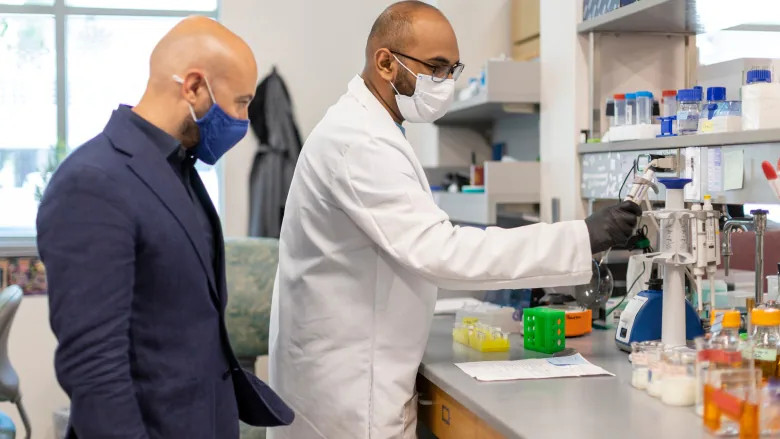The “Black in Pharma” panel, organized by the McGill Pharmaceutical Career Student Network (PCSN) and Advancing Black Talent in Pharma (ABTiP) on Feb. 9, was a candid talk about advancing equity, diversity, and inclusion (EDI) in pharmacology. Panellists included Corinne Buchanan-Russell, ABTiP president, Abraham Oniku, a senior manager in Medical Liaisons at Amgen Canada, and Jackie Hardwick, an associate of strategy and operations at Eli Lilly Canada.
Panellists started off by discussing their experience with EDI and the changes they have observed in pharma. Buchanan-Russell noted that the shared experiences of people of colour in the industry have united them and helped to create a culture of belonging. She referenced her own experience of waiting over 20 years to ultimately find such a platform that uplifts Black talent in the field.
“When we got together, we started with activities and initiatives that brought people together. And I remember our very first significant event, we were all at a Zoom meeting,” Buchanan-Russell said. “We asked everybody to turn on their cameras, and it was a very moving experience to see and be exposed to people who look like us.”
According to Oniku, there has been an increase in the number of Black people applying for roles in the pharmaceutical industry. A career in pharma is often associated with stiff competition, he explained, so there are some CV additions that young Black professionals should aim to have.
“One of the things that I’ve sometimes seen lacking in Black talent [are] things like internship, co-op, or volunteering—those things help a lot on your resume because people think that you’ve really done something beyond your regular school training,” Oniku said. “So I think, as a Black person, be aware that these are some of the things that employers and hiring managers are looking for.”
As per Hardwick, competent applicants may hesitate to submit their portfolios, as employers sometimes seek years of experience, even for entry-level positions. For Black applicants, having acquaintances and colleagues who can advise them on resumes and qualities prioritized by the hiring staff is an important competitive edge, which is why creating a more diverse and inclusive community is crucial.
“We could take back our organizations to say, ‘Hey, are we excluding great talent out there just by the virtue of how we’re articulating our job postings?’” Hardwick said.
Oniku believes that the protests sparked by the police killing of George Floyd in May 2020 changed the way Canadian pharma companies approach EDI.
“I’ve personally been very encouraged by how the pharma industry in Canada responded, ever since the George Floyd issue, to really step up with the [EDI] initiatives,” Oniku said. “[In] my company, for instance, there are a lot of concerted efforts to really bring in some of the interns that we have into the company to be Black or [another] minority group.”
Diversifying the workforce of pharmaceutical companies is essential, as both employers and employees benefit from a stronger feeling of belonging. Customers of different backgrounds also feel more welcome in an inclusive environment, Buchanan-Russell explained. As ABTiP president, Buchanan-Russell—who also has over 30 years of experience working in pharmacology in the U.S., Germany, and Canada—has witnessed first-hand how companies have changed their EDI policies.
“I think that one of the things that the industry is getting right is that they’re open, they’re listening, and recognizing that there are things that need to be changed and improved in terms of increasing the diversity of their employees,” Buchanan-Russell said.
Harwick added that although the implementation of EDI practices has ramped up at some companies, others are only just beginning to understand the importance of racial diversity in the workplace.
“We’ve got some variation within the industry, some companies are leading the way and making some great progress, others are probably in the earlier stages of their journey,” Hardwick said. “There is no end destination on this [since] the needs [and] the expectations continue to evolve. So we’ll have to be up for that challenge.”
As a lot of work still remains to be done, companies that develop life-saving drugs must rethink their approaches in order to create a medical community that supports everyone’s needs.









